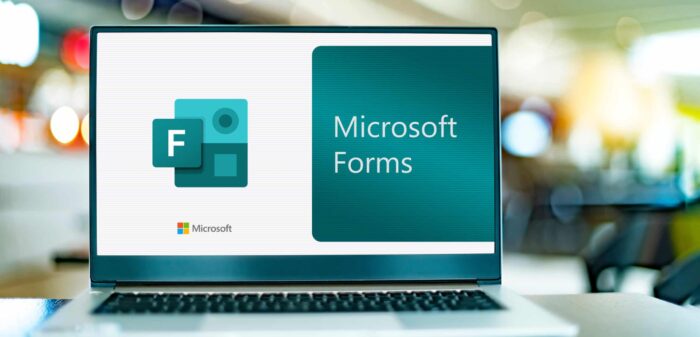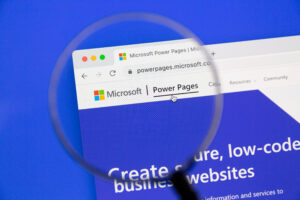What is Microsoft Forms?
In a world where attention spans are short and data is everything, the ability to quickly gather information can be the deciding factor in whether your company will succeed. You can collect employee feedback, run customer satisfaction surveys, or create interactive quizzes. Doing it quickly and securely is essential in the modern digital workplace. Gone are the days when forms were built manually or circulated through endless email threads. Companies that want to succeed today need smarter, more efficient tools. They need Microsoft Forms.
Outdated methods like paper surveys, clunky spreadsheets, and long email chains not only waste time but also increase the risk of data loss and miscommunication. These traditional processes slow down teams, delay insights, and create unnecessary bottlenecks. In a time where agility and responsiveness are key, relying on inefficient tools is no longer an option.
So, what is Microsoft Forms? It’s a streamlined, user-friendly platform for survey and form creation that’s fully integrated into the Microsoft 365 ecosystem. With just a few clicks, users can create forms, share them across devices, and view real-time results. You can do all these without needing advanced technical skills. It’s designed for everyone, from HR teams to educators to customer service reps, making data collection easier and more collaborative.
With Microsoft 365 Forms integration, Microsoft Forms works seamlessly within familiar tools like Outlook, Teams, and Excel. This reduces the need to switch between platforms and helps keep responses organized in one place. The result is a more straightforward process for collecting and analyzing information across teams.
What Is Microsoft Forms Used For?
Microsoft Forms is an online tool that allows users to create surveys, quizzes, and polls with minimal effort. It’s designed for quick, user-friendly form creation, making it easy to gather feedback, collect data, or conduct assessments without needing advanced technical skills. With its clean interface and built-in templates, you can design a form and start collecting responses in minutes.
Originally developed to support educators in creating quizzes and monitoring student performance, Microsoft Forms has since evolved into a versatile data collection tool. It is widely used today in business, education, and nonprofit groups for everything from customer feedback to employee engagement surveys. Its inclusion in the Microsoft 365 suite has helped it grow beyond its initial scope, becoming a practical resource for professionals across industries.
Microsoft Forms focuses on speed and simplicity. Users can build forms using a range of question types, including multiple choice, text, ratings, and more. Responses are captured in real time and displayed through basic visual summaries, allowing users to monitor feedback and make decisions without delay. For deeper analysis, data can be easily exported to Excel.
Collaboration is another key feature. With Microsoft Forms, multiple users can co-author a form, share it securely, and view results together. This makes it ideal for team-driven tasks such as planning events, gathering internal feedback, or coordinating project check-ins. The ability to share forms via a link or QR code adds to its convenience.
Thanks to Microsoft 365 forms integration, the tool works seamlessly with applications many organizations already use, such as Outlook, Microsoft Teams, and OneDrive. This means users don’t have to jump between platforms or manage separate accounts. As part of the Microsoft 365 ecosystem, Microsoft Forms offers a reliable, centralized approach to survey and form creation that supports collaboration and improves your business workflows.
4 Key Features and Capabilities
Microsoft Forms offers a wide range of tools that make it an effective solution for survey and form creation, perfect for the modern workplace. Its core strengths lie in simplicity, seamless integration, and enterprise-level security, which are all essential for efficient data collection. Below are four standout Microsoft Forms features that make it a reliable choice for individuals and organizations alike.
- Easy-to-Use Form Designer
At the heart of Microsoft Forms is its intuitive form builder, which enables drag-and-drop creation of surveys, quizzes, and polls. Users can add questions in various formats, like multiple choice, text, ratings, or Likert scales, without needing any design or coding experience. Customization options like themes and branching logic enhance usability and engagement, making this tool accessible for everyone from HR professionals to educators. You can also collect feedback or run a quick knowledge check because the interface makes form creation fast and easy to follow.
- Integration with Microsoft 365
One of the most powerful Microsoft Forms features is its deep integration with the Microsoft 365 ecosystem. Forms can be embedded in Teams channels, shared through Outlook, connected with SharePoint, or automated using Power Automate. Responses can also be exported to Excel for more detailed analysis. This smooth and easy compatibility allows users to create and manage forms without leaving their familiar workflow, enhancing collaboration and reducing time spent switching between tools.
- Real-Time Data Collection and Analytics
Microsoft Forms captures responses instantly, providing real-time summaries and charts as data is submitted. This allows users to monitor trends and results on the fly, supporting quicker decision-making. For more complex reporting needs, results can be exported to Excel or connected to Power BI for advanced data visualization. This immediate access to clean, structured feedback is a great advantage in any scenario requiring fast, actionable insights.
- Built-In Security and Compliance
For organizations prioritizing data protection, Microsoft Forms offers secure forms for business use. Built on the Microsoft Cloud, it includes enterprise-grade encryption, GDPR compliance, and role-based access controls. Knowing how to build secure forms with Microsoft Forms is key to using these features effectively. Administrators can manage sharing settings, limit access to internal users, and track form activity. These built-in protections make Microsoft Forms a trustworthy tool for your organization, so you can protect sensitive data and regulate it across industries.
Why IT Leaders Are Turning to Microsoft Forms
As more organizations look to modernize their internal workflows, IT leaders are increasingly adopting Microsoft Forms to support scalable solutions catered to users. One of the key benefits of Microsoft Forms for IT departments is that it empowers business units to create their own surveys, quizzes, and data collection tools without relying on developers or custom-built solutions. Teams can now create and deploy forms independently, reducing the IT workload, whether it’s HR running employee feedback surveys or finance collecting data for audits.
Microsoft Forms also plays a central role in simplifying internal processes and communication. Departments can use it to automate business processes, like onboarding checklists, event registrations, or internal polls, while integrating with Microsoft 365 apps such as Teams and SharePoint. Standardizing these processes through a familiar interface lets your organization reduce confusion, minimize delays, and ensure more consistent data across systems.
Another reason IT leaders are adopting Microsoft Forms is its ability to enhance decision-making through real-time data capture. As responses are submitted, results appear instantly in visual dashboards, allowing departments to act on insights without waiting for manual data entry or reporting. For more advanced needs, the integration with Excel and Power BI enables deeper analytics. This speed and accessibility help teams respond more quickly to emerging trends or issues.
Importantly, all of this comes without sacrificing security or compliance. Microsoft Forms is built on the Microsoft Cloud and provides secure forms for business use, offering features like encryption, GDPR compliance, and administrative controls over form sharing and access. This guarantees that IT leaders can maintain governance standards while lowering the support burden. Giving users the freedom to create and manage their forms safely will assist Microsoft Forms in delivering a balanced solution that supports both agility and oversight.
5 Best Use Cases for Microsoft Forms in Enterprise Environments
Organizations across industries are finding practical and effective ways to use Microsoft Forms to improve workflows, communication, and data collection. When evaluating Microsoft Forms vs other survey tools, many enterprises value its seamless integration with Microsoft 365, ease of use, and built-in security. Below are some of the best use cases for Microsoft Forms in enterprise environments.
- Employee Satisfaction Surveys
Understanding employee engagement and morale is critical for retaining talent and improving workplace culture. Microsoft Forms makes it easy for HR departments to create anonymous surveys, distribute them across Teams or Outlook, and view results in real time. Its simplicity encourages higher response rates, while integration with Excel enables deeper trend analysis across departments or periods.
- Customer Feedback Collection
Sales, marketing, and support teams can also use Microsoft Forms to gather direct input from customers on their experiences, preferences, or satisfaction levels. Unlike some external survey platforms, Microsoft Forms offers a more controlled environment, which is especially useful when customer data privacy is a concern. As part of broader business operations and customer management, responses can be instantly reviewed and acted upon, helping teams quickly address pain points or recognize success areas.
- Event Registrations and RSVPs
Managing internal or external events, such as webinars, can be improved with custom registration forms. Microsoft Forms allows organizers to collect RSVPs, dietary preferences, session choices, and more, all in one place. Data can be easily exported or shared with stakeholders, making planning more efficient and less reliant on third-party tools.
- Incident Reporting Forms
For facilities, IT, or compliance teams, Microsoft Forms can serve as a quick and secure channel for submitting incident reports. Employees can fill out structured forms to log technical issues, safety incidents, or policy violations. Built-in access controls and Microsoft 365 integration ensure reports are routed appropriately and stored securely, aligning with organizational governance.
- Training and Knowledge Assessments
Learning and development teams can use Microsoft Forms to create quizzes and assessments that test employees’ understanding after training sessions. Auto-grading, instant feedback, and exportable results make it ideal for tracking progress and identifying knowledge gaps. The form builder’s simplicity allows trainers to update or reuse assessments without needing IT support. Organizations can also use technology assessment services to design more advanced evaluation tools, ensuring that learning outcomes align with the technical competencies of the team.
How Microsoft Forms Fits into the Broader Microsoft 365 Ecosystem
Understanding how Microsoft Forms fits into Microsoft 365 begins with recognizing its tight integration with the tools many organizations already use daily. Microsoft Forms works smoothly alongside Teams, SharePoint, Excel, Power Automate, and Power BI. This integration allows users to embed forms directly into chats, webpages, or spreadsheets, making data collection a natural extension of everyday collaboration and communication.
Through Microsoft 365 forms integration, users can connect Forms to Power Automate to trigger workflows, such as notifications, approvals, or updates, based on form submissions. This means tasks like routing support tickets, confirming event registrations, or logging employee feedback can be automated with just a little effort. These connections help eliminate manual steps and improve efficiency in your operations across departments.
Forms also support more effective reporting and analysis. Survey data can be instantly exported to Excel or visualized in Power BI, enabling teams to uncover patterns and make data-driven decisions. Microsoft Forms complements enterprise reporting tools with structured and ready-to-use input, may it be for HR reviewing survey results or sales tracking customer satisfaction.
Beyond productivity, Microsoft Forms also contributes to unified governance and data security across the Microsoft 365 environment. Form access and sharing can be restricted based on user roles or organizational policies, and all data benefits from Microsoft’s enterprise-grade encryption and compliance frameworks. This gives IT teams peace of mind, knowing that sensitive form data is being collected and managed within secure, governed boundaries.
Why You Need i3solutions to Maximize Microsoft Forms
Microsoft Forms is a powerful platform, but to unlock its full potential, you need more than just basic form-building skills. You need a partner who can integrate Microsoft Forms seamlessly into your enterprise workflows, automate data-driven processes, and ensure security and scalability from day one.
That’s where i3solutions comes in.
As a trusted Microsoft Forms integration company and Microsoft 365 Forms solutions partner, we provide end-to-end Microsoft Forms development services for enterprises. Our team specializes in custom Microsoft Forms application development, designed to meet the unique requirements of modern organizations across industries.
Whether you’re launching a new initiative or replacing legacy tools, i3solutions helps you:
- Hire Microsoft Forms developers for Dynamics 365 projects
- Augment teams with Microsoft Forms and Power Platform talent
- Outsource Microsoft Forms workflow automation and surveys
- Rapid‑deploy Microsoft Forms developers and solution architects for fast, secure delivery
We go beyond surface-level forms. Our consultants design integrated solutions that connect Microsoft Forms to:
- SharePoint and Power Automate for list automation and workflow triggers
- Microsoft Teams for collaboration and real-time notifications
- Excel and Power BI for advanced analytics and reporting
- Line-of-business systems to enable intelligent decision-making
For organizations looking to move away from outdated technology, we’re also InfoPath to Microsoft Forms migration specialists. We ensure a smooth transition by reengineering legacy forms and rebuilding them within the secure, modern Microsoft 365 ecosystem.
From secure forms and branching logic to real-time analytics and deep integrations, i3solutions delivers scalable, compliant solutions tailored to your enterprise. Our approach balances governance, user experience, and automation to turn Microsoft Forms into a powerful extension of your digital workplace.
Contact i3solutions today to elevate your forms strategy with secure design, intelligent automation, and expert Microsoft 365 integration.
Leave a Comment












